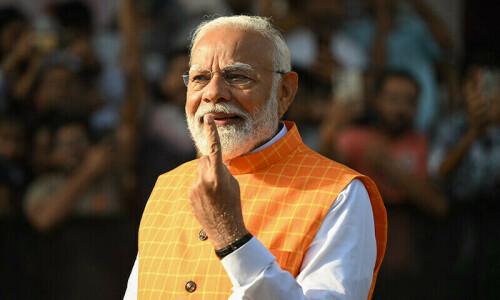Defence Minister Khawaja Asif has warned Afghanistan’s Taliban rulers that Islamabad will strike terrorist hideouts inside the neighbouring country if the latter were unable to rein in anti-Pakistan militants.
The minister made the remarks in an inclusive interview with Voice of America published on Wednesday. Asif’s comments come on the back of his earlier statement that the banned Tehreek-i-Taliban Pakistan (TTP) were using Afghan soil for carrying out attacks in Pakistan.
The defence minister said that in his visit to Afghanistan in late-February, he reminded the Taliban administration to live up to their cross-border security commitments forbidding terrorists from using Afghan soil to plan and conduct attacks on Pakistan or Islamabad will take action.
“We have communicated to Kabul during our last visit that please, as our neighbours and brothers, whatever is emanating from Afghan soil is your responsibility,” he said.
“If that is not done, at some point we’ll have to […] resort to some measures, which will definitely — wherever [terrorists] are, their sanctuaries on Afghan soil — we’ll have to hit them,” he said. “We’ll have to hit them because we cannot tolerate this situation for long.”
Asif went on to say that the Afghans responded to this “really well”.
“They responded well, really well. Perhaps for them to disentangle the TTP from this stage — of course they want to disentangle, this is my impression [that] they want to disentangle — but this disentanglement, perhaps, will take time.
“But they are doing well and we wish them well and we don’t want to get into a situation where this situation with the [TTP] escalates and we do something that is not to the liking of our neighbours and brothers in Kabul.”
During the interview, Asif was asked whether he believed the Taliban’s claim that the TTP were not using Afghan soil to carry out attacks in Pakistan.
He responded by saying, “They still operate from their soil.”
Asif was also asked about his assertion that the TTP were using weapons left behind by the US forces in Afghanistan. “Have you provided any evidence of that to the Americans?” the interviewer asked.
“It can be seen all over the place. On the streets of Kabul, I saw it myself,” the minister responded. He said that the TTP were using “light weapons, assault rifles, ammunition, night vision goggles and sniper rifles” which were left behind by US troops.
When asked whether this point had been raised with the Americans, Asif said: “What is the use of talking to Washington? They left that sort of hardware on foreign soil because they couldn’t carry it.”
The interviewer pointed out that the US State Department’s response to Pakistan’s assertion was that they did not have “an independent assessment”. She also asked whether Islamabad needed the help of the US in fighting terrorism in Pakistan.
“I do not see any logic in that,” the minister said. “My personal view is that we can take care of this […] menace ourselves,” Asif said, giving the examples of Zarb-i-Azb and Raddul Fassad.
He also termed the resurgence in terrorism in the country to be a “grave mistake” by the previous PTI government.
Military leadership to brief lawmakers on security situation.
Separately, while speaking on the floor of the National Assembly on Thursday, Asif said that the House would be given an in-camera briefing tomorrow (Friday) on the country’s security situation.
He said that the military leadership would brief parliament regarding the state’s policy on countering militancy, stating that the security establishment was cognisant of the prevailing situation.
Prime Minister Shehbaz Sharif said the same and assured that a “healthy interaction” would take place tomorrow in which legitimate concerns raised during the session would be answered.
Last week, the top civil and military leadership reaffirmed their commitment to thwart terrorism threats and vowed to relaunch the National Action Plan (NAP) within 15 days to crush militants reportedly coming in from Afghanistan.
The decisions were made at the National Security Committee (NSC) meeting, which the government said was in continuation of a previous meeting convened after a militant attack inside Peshawar’s police headquarters in January, in which 86 people, mostly police officials, were martyred.
Political parties, including allies of the federal government, however, have expressed their concerns over the possible military offensive against militants, with most saying that those who brought back the militants should be brought to justice before launching an offensive against militants.
Addressing the NA session today, MNA Ali Wazir said that the country’s current policy regarding militancy needed to be reviewed.
“I appeal to the incumbent government that those responsible for the rise in terrorism […] those who brought these militants into Pakistan should be punished,” he said.
“Until and unless these people are punished, we won’t allow the new operation to commence,” he added.
Agreeing with Wazir, MNA Mohsin Dawar said that operations were cinducted in the past but none of them were successful in eliminating terrorism.
“This is because you are confused. There is no clarity in your policy. You send mixed signals,” he asserted.












































